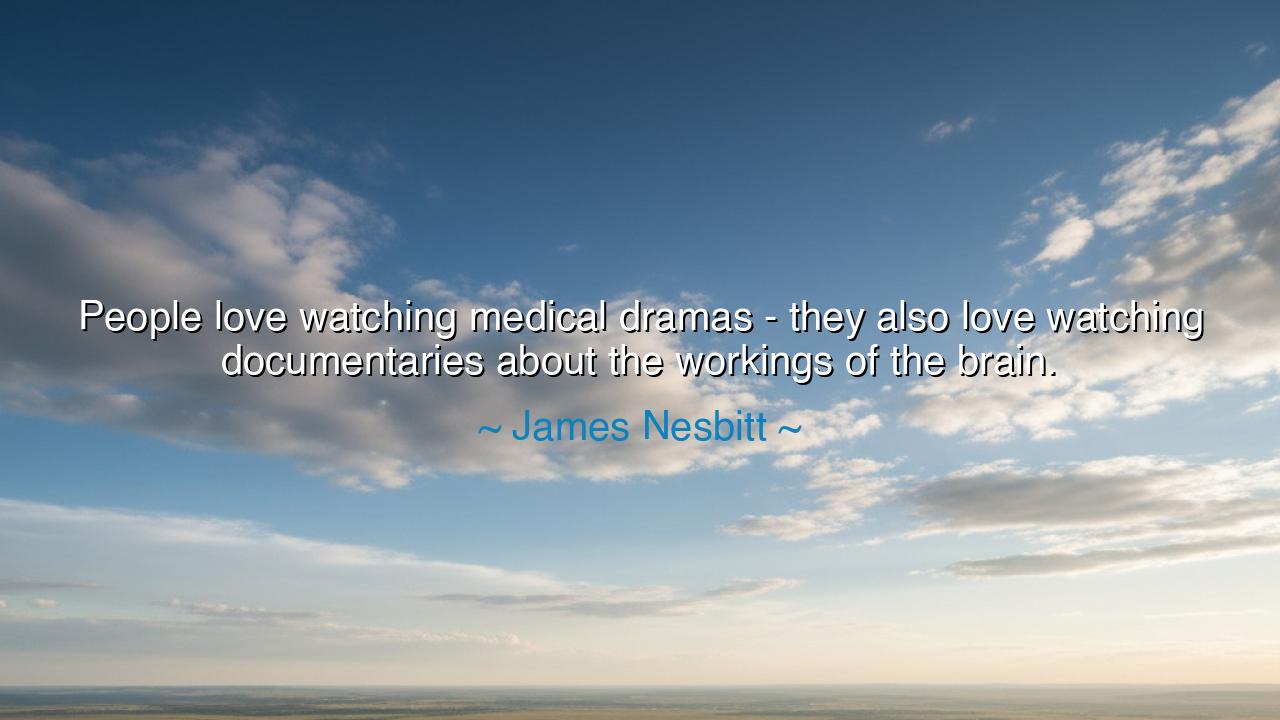
People love watching medical dramas - they also love watching
People love watching medical dramas - they also love watching documentaries about the workings of the brain.






Hear, O children of wonder, the words of James Nesbitt, who observed with clarity: “People love watching medical dramas – they also love watching documentaries about the workings of the brain.” In this statement lies the secret fire of human curiosity: that men and women are drawn, with equal parts awe and fear, to the mysteries of the body and the labyrinth of the mind. For what could be more compelling than the dramas of life and death, or the enigmas of thought itself, where the soul seems to meet the flesh?
The meaning of these words is twofold. On one hand, medical dramas captivate because they reveal the intensity of human struggle—blood, crisis, healing, loss, and triumph. They show doctors and nurses as warriors in white coats, fighting against the shadows of mortality. On the other hand, documentaries about the brain fascinate because they open the hidden chambers of our own being. They whisper to us of memory, thought, dreams, and identity. Both kinds of stories stir the heart because they touch upon what is most fragile and most profound: the mystery of being alive.
Consider, my children, the tale of Andreas Vesalius, the Renaissance physician who dared to open the human body and map its secrets. His dissections, though scandalous in his time, revealed the truth of anatomy and gave birth to modern medicine. The people of his age were horrified and mesmerized, just as modern audiences are enthralled by dramas of surgery and by explorations of the brain. For even then, as now, the veil between life and death, ignorance and knowledge, filled humankind with a strange mixture of dread and wonder.
The origin of Nesbitt’s insight springs from his craft as an actor, one who has seen firsthand how audiences cling to stories of doctors, patients, and scientists. He has observed that the stage of the hospital and the stage of the human mind are among the most powerful theaters of all. Why? Because both are places where the stakes could not be higher. A life may be saved or lost, a mind may be broken or healed, and within such moments, we glimpse truths about ourselves that ordinary tales cannot reveal.
Let us not mistake this fascination for idle entertainment. To love medical dramas and documentaries of the brain is to express humanity’s eternal hunger for knowledge and meaning. In watching the struggles of others, we ask ourselves: “How would I face death? How do I understand life? What is the essence of the mind that thinks these very thoughts?” Thus these stories are not distractions, but mirrors, showing us who we are and what we might become.
The lesson is clear: do not shy away from the mysteries of body and mind. Seek to understand them, for in that understanding is wisdom. Medicine teaches us compassion and courage; the study of the brain teaches us humility and awe at the complexity of human thought. To ignore these is to live only on the surface; to engage with them is to live deeply, with reverence for both the fragility and the resilience of life.
Practical actions lie before you: when you encounter such dramas, do not watch with passive eyes, but let them stir your heart toward gratitude for the healers in our midst. When you view the wonders of the brain, let them inspire you to treat every person with reverence, for within each skull lies a universe of thoughts, memories, and dreams. Teach your children that the mysteries of medicine and mind are not distant, but close to their own lives, shaping every breath, every thought, every heartbeat.
Thus, O heirs of tomorrow, Nesbitt’s words remind us of the sacred power of storytelling and knowledge. People love to watch because, deep within, they long to understand. The drama of medicine and the mystery of the brain are not separate—they are two sides of the same eternal quest: to fathom life itself. And as long as that quest endures, so too will the love of stories that guide us closer to truth. Seek these stories, and you shall grow not only in knowledge, but in wisdom and compassion.






AAdministratorAdministrator
Welcome, honored guests. Please leave a comment, we will respond soon